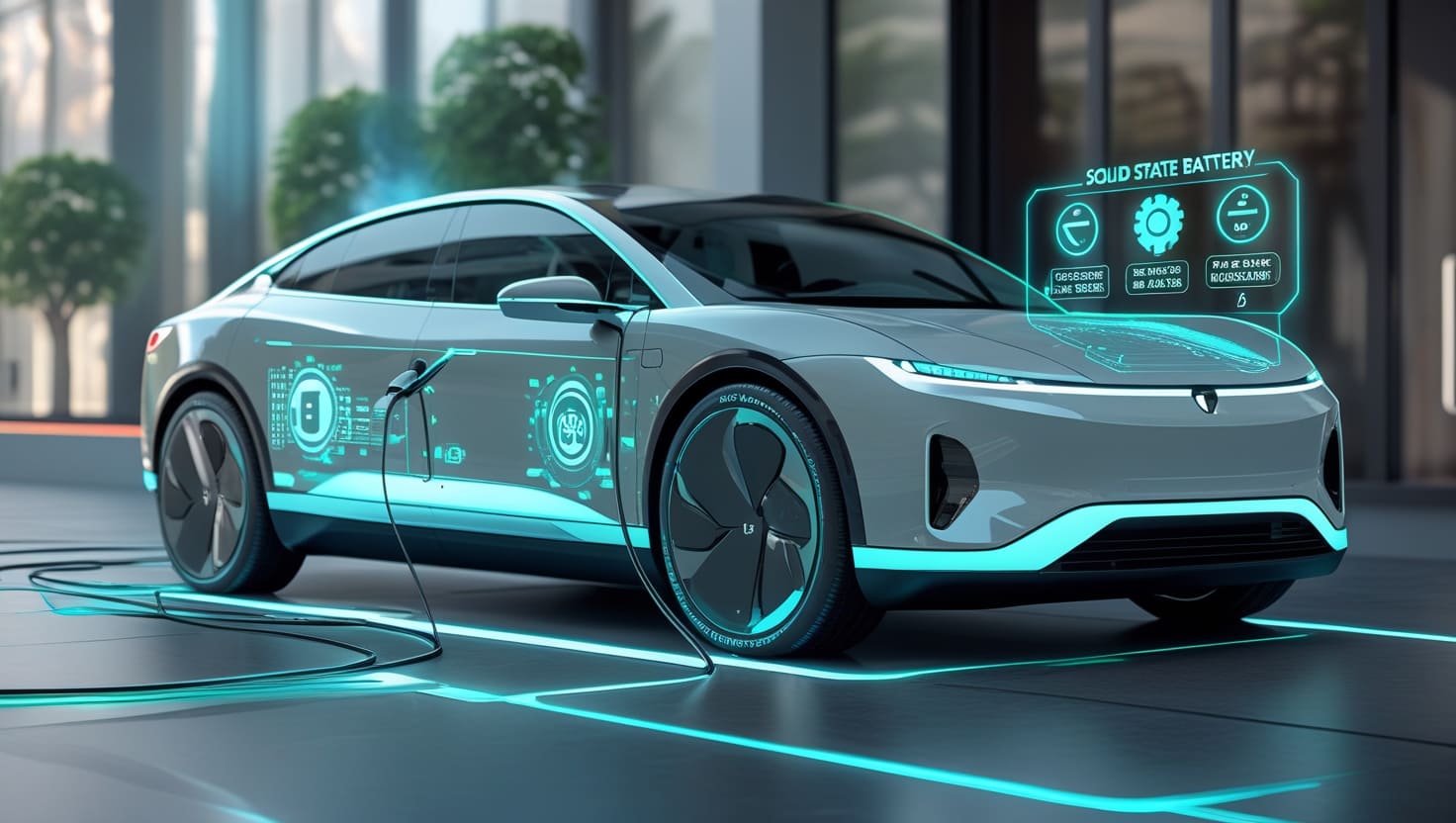As the world accelerates toward an electric vehicle (EV) future, battery technology remains at the core of this transformation. While lithium-ion batteries have powered the current wave of EVs, a revolutionary advancement is now on the horizon: solid state batteries. Touted as the next-generation power source for electric vehicles, solid state batteries promise to overcome many limitations of today’s battery technology, unlocking new levels of range, safety, performance, and sustainability.
In this comprehensive article, we explore how solid state batteries work, the innovations they bring to electric vehicles, the challenges they face, and why many experts believe they represent the future of EV technology.
The Rise of Electric Vehicles
Before diving into solid state batteries, it’s important to understand the larger EV revolution. Global EV adoption is surging due to:
- Growing concerns over climate change.
- Government regulations pushing for zero-emission transportation.
- Declining costs of battery production.
- Expanding charging infrastructure.
- Consumer demand for cleaner, quieter, and more efficient vehicles.
However, current lithium-ion batteries still present challenges such as limited range, long charging times, safety concerns related to overheating, and gradual performance degradation.
What Are Solid State Batteries?
Solid state batteries differ from traditional lithium-ion batteries in one critical way: they use a solid electrolyte instead of a liquid or gel-based electrolyte.
Key Components:
- Anode: Often made of lithium metal, enabling higher energy density.
- Cathode: Similar to those used in lithium-ion cells, but optimized for solid state chemistry.
- Solid Electrolyte: Made from ceramic, glass, sulfide, or polymer materials, replacing flammable liquid electrolytes.
This solid electrolyte is what gives these batteries their name and offers multiple technical advantages.
Advantages of Solid State Batteries for EVs
1. Higher Energy Density
Solid state batteries can store significantly more energy than conventional lithium-ion cells of the same size. This means:
- Longer driving range per charge.
- Smaller, lighter battery packs.
- Increased space for passengers or cargo.
In some prototypes, solid state batteries offer up to 2x or even 3x the energy density of current EV batteries.
2. Faster Charging Times
Thanks to improved ionic conductivity and reduced risk of overheating, solid state batteries can:
- Handle higher charging currents.
- Reach 80% charge in as little as 10-15 minutes.
- Support ultra-fast charging stations without compromising safety.
3. Improved Safety
Traditional lithium-ion batteries carry a risk of thermal runaway, fires, and explosions due to flammable liquid electrolytes. Solid state batteries:
- Eliminate liquid electrolytes entirely.
- Operate at lower risks of overheating or combustion.
- Provide safer operation in extreme temperatures.
4. Longer Lifespan
Solid state batteries degrade more slowly, offering:
- Longer cycle life.
- Higher charge-discharge efficiency.
- Sustained performance over years of use.
This extended longevity lowers total cost of ownership for EV buyers.
5. Wider Operating Temperature Range
Solid state chemistry allows these batteries to function efficiently across a broader range of temperatures, making them more reliable in hot and cold climates.
How Solid State Batteries Work
At the core of a solid state battery’s innovation is the replacement of the liquid electrolyte with a solid material. Here’s how it improves performance:
- Ion Movement: Lithium ions move through the solid electrolyte more efficiently under certain conditions.
- Dendrite Prevention: Lithium metal anodes reduce the formation of dendrites — tiny growths that can short-circuit batteries.
- Tighter Packaging: Without liquid, battery cells can be packed more compactly.
These innovations work together to create a battery that is safer, smaller, more powerful, and faster to charge.
Why Solid State Batteries Matter for the EV Industry
The limitations of today’s EVs mostly revolve around range anxiety, charging time, and safety concerns. Solid state batteries directly address these issues, potentially offering:
- EV ranges exceeding 500 to 1,000 miles on a single charge.
- 10-minute fast charging sessions.
- Superior safety profiles, reducing insurance costs and consumer hesitancy.
- Greater design flexibility for automakers.
For consumers, this means EVs that are finally as convenient—or even more convenient—than traditional gasoline-powered vehicles.
Companies Leading Solid State Battery Development
Numerous companies and research institutions are racing to commercialize solid state batteries. Some of the leading players include:
- Major automotive manufacturers heavily investing in next-gen EV technology.
- Specialized battery startups working exclusively on solid state solutions.
- Research labs developing advanced materials and solid electrolyte formulas.
As competition heats up, breakthroughs in manufacturing, materials science, and scalability are rapidly pushing solid state batteries closer to commercial viability.
Challenges Facing Solid State Batteries
Despite their potential, solid state batteries still face several significant challenges before full-scale EV deployment:
Manufacturing Complexity
- Producing solid state batteries at high volumes requires specialized equipment and manufacturing processes.
- Mass production remains costly and technically difficult.
Material Limitations
- Finding solid electrolytes that offer both high ionic conductivity and long-term stability remains a challenge.
- Some materials are brittle, creating issues with durability.
Cost
- Solid state batteries currently remain more expensive than lithium-ion batteries due to limited production and material costs.
- Economies of scale are needed to drive prices down for mass-market EV adoption.
Scalability
- Manufacturing solid state batteries consistently at automotive scale requires breakthroughs in production efficiency and quality control.
The Timeline for Mass Adoption
Experts predict that early commercial solid state EVs could appear in limited quantities by 2025-2027. Widespread mass adoption may follow in the 2030s, once production challenges are overcome and costs drop.
Key factors influencing adoption timelines include:
- Ongoing breakthroughs in solid electrolyte materials.
- Scaling up production facilities.
- Partnerships between battery makers and automakers.
- Government incentives promoting advanced battery technologies.
Environmental Benefits of Solid State Batteries
Solid state batteries contribute to sustainability in several ways:
- Reduced material usage: Smaller, lighter batteries require fewer raw materials.
- Lower risk of toxic leaks: Solid electrolytes are more environmentally stable.
- Extended lifespan: Longer-lasting batteries reduce electronic waste.
- Higher recycling potential: Simplified cell structures could make recycling easier.
For the EV industry to meet global sustainability goals, solid state batteries offer a more eco-friendly solution compared to existing lithium-ion technologies.
The Future of Solid State Batteries in EVs
As solid state battery development accelerates, future EVs may feature:
- Compact battery packs with ultra-long ranges.
- Charging times that rival conventional refueling.
- Extended lifespans matching the full life of the vehicle.
- Lightweight designs improving overall vehicle efficiency.
- Safer operation across all driving conditions.
In the long term, solid state batteries may not only revolutionize electric cars but also power electric aviation, heavy transport, consumer electronics, and grid-level energy storage solutions.
Conclusion
Solid state batteries represent one of the most exciting frontiers in electric vehicle technology. By solving many of the current pain points associated with lithium-ion batteries — including range, safety, charging time, and longevity — they have the potential to fundamentally transform the EV landscape.
While technical hurdles remain, rapid advancements in research and manufacturing are bringing solid state batteries closer to widespread commercialization. In the coming years, they may redefine how we think about electric mobility and help accelerate the world’s transition toward a fully electric, sustainable transportation future.
Do you believe solid state batteries will be the breakthrough that makes EVs mainstream for everyone? Share your thoughts in the comments below!





